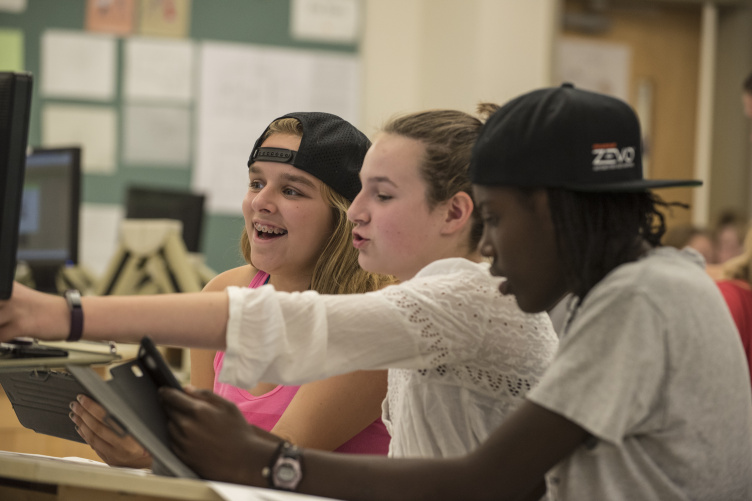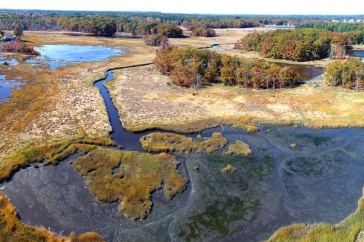
Marra MacMillan, Sydney Deblois-Hill and Olivia Krug make critical connections to develop their ski guide app. Photo: Joe Klementovich
On a sunny summer morning at Kennett High School in North Conway, New Hampshire, 17 middle school girls click away at their computer keyboards. They’re participating in the weeklong Creative Computing Challenge teacher training and summer camp program.
Claes Thelemarck, a youth and family field specialist with UNH Cooperative Extension, demonstrates the steps they must take to complete the apps they’ve designed on their tablets using MIT App Inventor, free software students can use to create their own applications for mobile devices.
As the students work, a group of teachers quietly observes. This workshop is also a learning lab for a cohort of five high school teachers who want to introduce computational skills into their classes. They have signed on for a yearlong commitment to the program; during 12 months they will attend workshops and meet with the program’s faculty, educators and Extension specialists to share their experiences. At this camp, they will master App Inventor, observe new teaching methods and explore ways to engage students who are underrepresented in computing.

Amanda Howe and Dakota Moody share their apps. Photo: Joe Klementovich
The camp focuses on developing a classroom community. By emphasizing communication and teamwork skills rather than technical expertise, students relax and get to know each other. In one activity, a Lego icebreaker, students pair up back-to-back with one explaining how to construct something while the other completes the task.
Using the software, “Students were encouraged to integrate their own passions and hobbies,” says Sarah Grosvenor, Cooperative Extension’s science literacy field specialist.
While participants work on designing travel guides, quizzes, musical explorations and sports info apps, Thelemarck and Grosvenor circulate through the room to provide one-on-one instruction and work with small groups of students.
Mihaela Sabin, associate professor of computer science at UNH Manchester, leads the Creative Computing Challenge, a five-year NH EPSCoR project funded by the National Science Foundation.
In these middle school students Sabin sees future technology innovators who will drive New Hampshire’s economy.
“One stereotype that prevents girls from being interested in computing is about how technology professionals are perceived,” says Sabin. “Girls in middle school and high school imagine a lonely programmer working on a laptop with little collaboration or communication with coworkers and teammates. Unfortunately, many girls see working in technology as kind of geeky and lacking meaningful social interactions.”
It may seem surprising that girls and women are still a minority in computer science disciplines and careers, but data confirms it. For example, only 45 out of the 521 students enrolled in information technology courses at New Hampshire’s career and technology education centers in 2015 were female.

Yet, with encouragement, girls can thrive in computer-related disciplines while gaining experience needed to enter a fast-growing industry with high-paying jobs.
As these young women develop their first apps, they also develop new interests and awareness. Dakota Moody of North Conway designed a multiple-choice quiz to “Guess the YouTuber” by its audio intro.
Marra MacMillan, also of North Conway, and Olivia Krug from Conway, both 13 and devotees of skiing, developed an app that provides information on nearby ski areas, lodging and equipment.
Christina Solomon of Conway designed an app to give users information about all of New Hampshire’s mountains with elevations of over 4,000 feet. “My dad and I want to climb all of them,” says Solomon, who is 13. “My app links mainly to two websites. You can see the difficulty of the climb along with photos and descriptions.”
Eleven-year-old Ella Fecteau of Conway designed a music app that incorporates a graphic made out of musical notes. When asked about the all-girls camp, she says, “Well, we can all relate. Usually, I’m the only girl. This coding, though, is the real stuff. It’s not just cut-and-paste. When I go home, I plan to keep working on my app."
Now in its third year, the Creative Computing Challenge’s teacher network and reputation is growing. During the school year, the teachers will receive support in curricular design from Erik Froburg, education and outreach specialist at the UNH Leitzel Center for Mathematics, Science, and Engineering Education, as well as advanced technical support if needed from Sabin or other UNH computing experts.

Audra Hamlin gets some tips from Kennett High School teacher Dan Richardi. Photo: Joe Klementovich
Carrie Duran, who teaches hospitality and hotel management at the Lakes Region Technology Center at Kingswood Regional High School in Wolfeboro, plans to develop an app for local hotels. “It would help my students learn how to market a product and benefit the community,” she says.
Another Kingswood teacher, Mary Ellen Bridges, says App Inventor will let her build code into the photography, photo technology and communication technology courses she teaches. “Advertising is dynamic now. It’s interactive. Students with interests in photography and graphic design need to know these skills,” she says.
Duran and Bridges plan to work together to build their teaching units.
At Kennett High School, Joe Riddensdale, who teaches computer-aided design, and Dan Richardi, who teaches computer programming, will collaborate, as will Belmont High School science teacher Adrien Deshaies and Justin Bourque, an alumnus of the Creative Computing Challenge who teaches in Concord.
Next year, the all-girls middle school summer camp will take place in the Seacoast area of New Hampshire. The program will be looking for six more teachers from schools between Rochester and Salem to integrate the Creative Computing Challenge into their 2017 classes and attend a May introductory teacher workshop.
—Carrie Sherman

















































